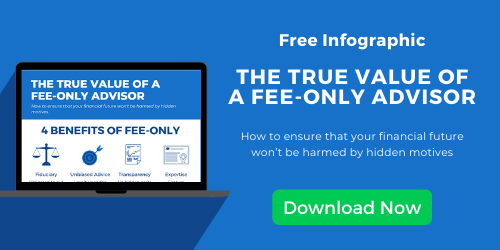The Difference Between Privacy and Secrecy
%20-%20Trust%20Fall%20Graphic%20-%20JPEG%20-%202-27-2020.jpg?width=945&name=Image%20-%20Blog%20Image%20-%20Joe%20-%20The%20Difference%20Between%20Privacy%20and%20Security%20(updated)%20-%20Trust%20Fall%20Graphic%20-%20JPEG%20-%202-27-2020.jpg)
Be Honest With Your Advisor
In a recent study conducted by eMoney Advisor, it was revealed that 30% of clients are not honest about spending habits. Mistakes happen and situations change. Old recommendations may no longer be as useful as when they were originally. Your advisor should never judge decisions that were made in the past, but instead give advice moving forward. Any areas of concern should be discussed openly to ensure an appropriate course for correction is laid out.
When discussing finances, there are certain facts that must be reviewed and verified. A good personal trainer assesses their client's physical ability and knowledge before jumping into advanced weightlifting techniques. The development of a financial plan prioritizes focusing on certain areas ahead of others. Saving for a child's education or buying a new home often take a backseat to paying off high interest debt and taking a deep dive into spending habits. The best advice comes from having accurate and detailed facts. The most thorough plan is useless if key data points are left out. Chances are, you're getting an incorrect answer to "when can I retire?" if you're not being straightforward with the monsters in your closet.
Find an Advisor You Can Trust
The same study referenced above found that 43% of clients had negative feelings while talking about money. Being open to discuss all aspects of your finances, the good, the bad, and the ugly, starts with an advisor you can trust. However, that isn't the only item you need to check off. It's also important to find someone who can keep you accountable and on track. Someone you know is competent enough to propose a sound course of action free of conflicts of interest.
Similarly to attorney-client privilege or doctor-patient confidentiality, the finance industry must adhere to SEC Regulation S-P which strictly prohibits the sharing of any nonpublic client information. Security and confidentiality are areas that Exchange Capital Management takes pride in. Each employee is required to complete ongoing security and compliance training. Without the proper authorizations, our client data is never revealed.
If you aren't honest with your advisor, are you being honest with yourself? To draw on yet another medical analogy, the treatment response for someone who has high blood pressure from a little too much red meat in their diet and someone who has family history of heart disease and stroke is going to be calibrated quite differently. Private matters are between you and a trusted advisor. Secrets on the other hand, almost always are revealed, but not before some damage is done. If you're interested in starting your search for a competent, honest, and reliable professional, check out our previous blog.
Joe Crowley, CFP® is a Financial Planning Specialist at Exchange Capital Management. The opinions expressed in this article are his own.
Comments
Market Knowledge
Read the Blog
Gather insight from some of the industry's top thought leaders on Exchange Capital's team.
Exchange Capital Management, Inc.
110 Miller Ave. First Floor
Ann Arbor, MI 48104
(734) 761-6500
info@exchangecapital.com



